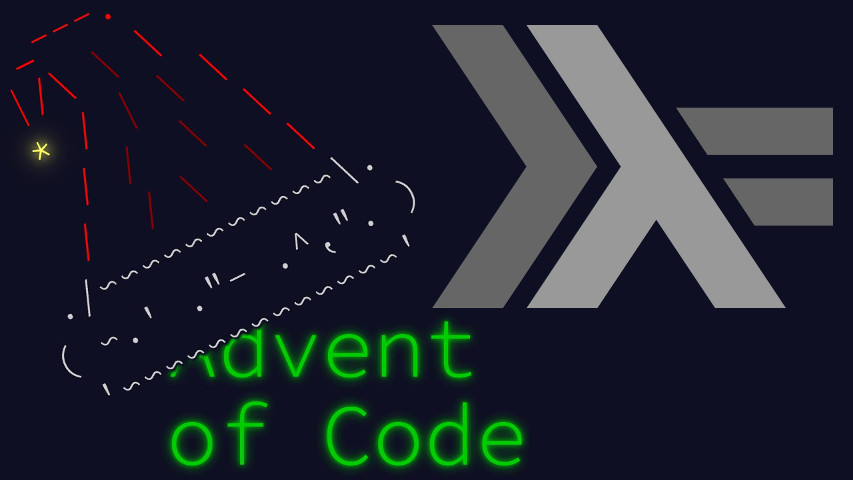We’ll perform some “Monkey Math” for today’s Advent of Code puzzle. Using a totally overpowered solver, because I didn’t want to follow along and type all of the code for the part 2 twist.1
No surprise, this is still literate Haskell and a header of imports.
import Data.Bifunctor (first)
import Data.Map.Lazy (Map,(!))
import qualified Data.Map.Lazy as Map
import Data.SBV
import Data.SBV.Internals (SMTModel(SMTModel),modelAssocs)The traditional mid-puzzle twist is a great idea. Its realization, on the other hand, is a bit disappointing, as it not only reinterprets the input, which is always interesting, but actually goes as far as making part of the puzzle input useless, which is a bit lame.
So I can’t easily have a single parsing function to solve it all. Or rather, I can’t parse to a really usable form, I must keep along pseudo-redundant information to be hammered back into shape for part 2.
Too bad.
So my intermediate representation will be a map of monkey name to a pair of an operation and a pair of monkey names to perform it on. Yes, this does allow for the puzzle input’s literals, implemented as an operation that simply ignores its inputs and returns what it wants.
type Parse = Map String (SInteger -> SInteger -> SInteger,(String,String))Parsing is then uninteresting, you may just want to notice I’m using
SIntegers instead of the standard Haskell types. More on
that later.
parse :: String -> Parse
parse = Map.fromList . map monkey . lines where
monkey (words -> (init -> name) : ws) = (name,) $ case ws of
[read -> n] -> (const (const (fromInteger n)),undefined)
[m1,op,m2] -> case op of
"+" -> ( (+),(m1,m2))
"-" -> ( (-),(m1,m2))
"*" -> ( (*),(m1,m2))
"/" -> (sDiv,(m1,m2))The data structure I’d really want to be handling is the map of monkey to numbers. Here’s how to obtain it from the parse result.
apply :: Parse -> Map String SInteger
apply m = m' where m' = Map.map (\(op,~(a,b)) -> op (m'!a) (m'!b)) mThe lazy pattern match ~(a,b) is there so I can afford
not to write out an entire pair of undefineds when parsing
literals.2
In part 1, we’re merely computing the value assigned to the monkey named root. Let’s go overboard and solve it with Z3. I’ll first define a symbolic variable named root.
part1,part2 :: Parse -> Symbolic SBool
part1 m = do
root <- sInteger "root"And then equate it with the one in the monkey map.
solve [apply m!"root" .== root]A small utility then compiles that to Z3 and extracts the resulting binding.
resolve :: Provable p => p -> IO ()
resolve p = do
SatResult (Satisfiable _ SMTModel{modelAssocs = [res]}) <- sat p
print resThis is obviously not needed, I could really just read the value out
of SBV without calling a solver on it, or even just compute
it at parse time.3
But for part 2, direct parsing isn’t enough: we need to reverse the operations of the entire tree chain from root to the monkey named hunm. Which is too much typing.
So I’ll replace the monkey named humn’s literal with a named symbolic variable, replace root’s operation with a subtraction, and equate its value to 0.
part2 m = do
humn <- sInteger "humn"
let m' = Map.insert "humn" (const (const humn),undefined) $
Map.adjust (first (const (-))) "root" m
solve [apply m'!"root" .== 0]A little wrapper then concludes the code.
main :: IO ()
main = do
m <- parse <$> getContents
resolve $ part1 m
resolve $ part2 mSo I think it’s the second time this year I’m mildly disappointed at a puzzle that was pretty close to being very nice, but where some minor aspect of the part 2 twist ruins the fun. Really, just making the root monkey’s operation a subtraction would have gone such a long way…
Oh well.
See you tomorrow!
A total lie, I really got my stars by typing all the code for the part 2 twist. But it didn’t feel satisfying, and I’d wanted to get familiar with Z3 some time ago already, so here we are with a rewritten solution.↩︎
The benefit of that being later on negated by me having to explain it.↩︎
As I got my first star, obviously.↩︎



